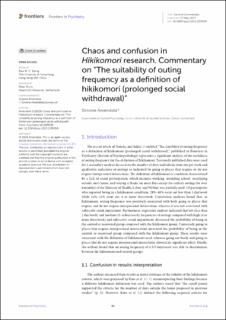Please use this identifier to cite or link to this item:
https://doi.org/10.21256/zhaw-29241| Publication type: | Article in scientific journal |
| Type of review: | Editorial review |
| Title: | Chaos and confusion in Hikikomori research : commentary on “The suitability of outing frequency as a definition of hikikomori (prolonged social withdrawal)” |
| Authors: | Amendola, Simone |
| et. al: | No |
| DOI: | 10.3389/fpsyt.2023.1199359 10.21256/zhaw-29241 |
| Published in: | Frontiers in Psychiatry |
| Volume(Issue): | 14 |
| Issue: | 1199359 |
| Issue Date: | 17-May-2023 |
| Publisher / Ed. Institution: | Frontiers Research Foundation |
| ISSN: | 1664-0640 |
| Language: | English |
| Subjects: | Hikikomori; Social withdrawal; Interpersonal interaction; Definition; Kommentar |
| Subject (DDC): | 616.89: Mental disorders, clinical psychology and psychiatry |
| Abstract: | The recent article of Nonaka and Sakai entitled “The suitability of outing frequency as a definition of hikikomori (prolonged social withdrawal),” published in Frontiers in Psychiatry (Section of Psychopathology) represents a significant analysis of the usefulness of outing frequency for the definition of hikikomori. Previously published data were used for a secondary analysis focused on the number of days individuals went out per week and qualitative indicators of outings as indicated by going to places that require or do not require interpersonal interactions. The definition of hikikomori (a condition characterized by a lack of social participation, which includes working, attending school, socializing outside one’s home, and staying at home on most days except for solitary outings for over 6 months) of the Ministry of Health, Labor, and Welfare was partially used. Of participants who reported being in a hikikomori condition, 28%–48% went out less than 1 day/week while 14%–21% went out 4 or more days/week. Correlation analyses found that, in hikikomori, outing frequency was positively associated with both going to places that require and do not require interpersonal interactions, whereas it was not associated with subjective social impairment. Furthermore, regression analyses indicated that low (less than 1 day/week) and medium (1–4 days/week) frequencies of outings compared with high (4 or more days/week) and subjective social impairment, decreased the probability of being in the control or recovered group compared with the hikikomori group. Conversely, going to places that require interpersonal interactions increased the probability of being in the control or recovered group compared with the hikikomori group. These results were consistent with the definition of hikikomori used, whereas going out freely and going to places that do not require interpersonal interactions showed no significant effect. Finally, the authors found that an outing frequency of 4.5/5 days/week was able to discriminate between the hikikomori and control groups. |
| URI: | https://digitalcollection.zhaw.ch/handle/11475/29241 |
| Fulltext version: | Published version |
| License (according to publishing contract): | CC BY 4.0: Attribution 4.0 International |
| Departement: | Applied Psychology |
| Organisational Unit: | Psychological Institute (PI) |
| Appears in collections: | Publikationen Angewandte Psychologie |
Files in This Item:
| File | Description | Size | Format | |
|---|---|---|---|---|
| 2023_Amendola_Chaos-and-confusion-in-Hikikomori-research-commentary_fpsyt.pdf | 168.33 kB | Adobe PDF |  View/Open |
Show full item record
Amendola, S. (2023). Chaos and confusion in Hikikomori research : commentary on “The suitability of outing frequency as a definition of hikikomori (prolonged social withdrawal)”. Frontiers in Psychiatry, 14(1199359). https://doi.org/10.3389/fpsyt.2023.1199359
Amendola, S. (2023) ‘Chaos and confusion in Hikikomori research : commentary on “The suitability of outing frequency as a definition of hikikomori (prolonged social withdrawal)”’, Frontiers in Psychiatry, 14(1199359). Available at: https://doi.org/10.3389/fpsyt.2023.1199359.
S. Amendola, “Chaos and confusion in Hikikomori research : commentary on “The suitability of outing frequency as a definition of hikikomori (prolonged social withdrawal)”,” Frontiers in Psychiatry, vol. 14, no. 1199359, May 2023, doi: 10.3389/fpsyt.2023.1199359.
AMENDOLA, Simone, 2023. Chaos and confusion in Hikikomori research : commentary on “The suitability of outing frequency as a definition of hikikomori (prolonged social withdrawal)”. Frontiers in Psychiatry. 17 Mai 2023. Bd. 14, Nr. 1199359. DOI 10.3389/fpsyt.2023.1199359
Amendola, Simone. 2023. “Chaos and Confusion in Hikikomori Research : Commentary on “The Suitability of Outing Frequency as a Definition of Hikikomori (Prolonged Social Withdrawal)”.” Frontiers in Psychiatry 14 (1199359). https://doi.org/10.3389/fpsyt.2023.1199359.
Amendola, Simone. “Chaos and Confusion in Hikikomori Research : Commentary on “The Suitability of Outing Frequency as a Definition of Hikikomori (Prolonged Social Withdrawal)”.” Frontiers in Psychiatry, vol. 14, no. 1199359, May 2023, https://doi.org/10.3389/fpsyt.2023.1199359.
Items in DSpace are protected by copyright, with all rights reserved, unless otherwise indicated.